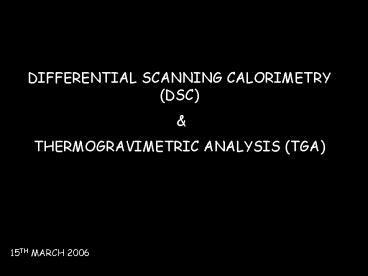DIFFERENTIAL SCANNING CALORIMETRY DSC - PowerPoint PPT Presentation
1 / 12
Title:
DIFFERENTIAL SCANNING CALORIMETRY DSC
Description:
Cover the temperature range from -60 to 1600 C with ... Measure the temperatures and heat flows associated with ... SCANNING CALORIMETER DSC ... – PowerPoint PPT presentation
Number of Views:1277
Avg rating:3.0/5.0
Title: DIFFERENTIAL SCANNING CALORIMETRY DSC
1
DIFFERENTIAL SCANNING CALORIMETRY (DSC)
THERMOGRAVIMETRIC ANALYSIS (TGA)
15TH MARCH 2006
2
Differential Scanning Calorimetry (DSC)
A thermal analysis technique
Measure the temperatures and heat flows
associated with transitions in materials as a
function of time and temperature.
Provide qualitative and quantitative information
about physical and chemical changes that involve
endothermic and exothermic processes, or changes
in heat capacity.
Cover the temperature range from -60 to 1600C
with variable atmospheres.
3
Differential Scanning Calorimetry (DSC)
Melting and Crystallization Temperatures
Glass Transition Temperatures Transition
Temperatures of Polymers Enthalpies of Fusion
and Crystallization Degree of Cure or Degree of
Crystallinity Assessing the Thermal Stability
of Chemicals Specific Heat Capacity U.S.
Pharmacopeia DSC test for High and Low Density
Polyethylene U.S. Pharmacopeia DSC test for
polyethylene terephthalate
4
Thermogravimetric Analysis (TGA)
Measures changes in weight of a sample with
increasing temperature.
Typical heating rate is 10 per minute. Optimum
sample size is 50100mg. No sample preparation is
necessary.
5
Thermogravimetric Analysis (TGA)
Volatility Rate Rubber-Compositional
Analysis Test Methods for Rubber
Products-Chemical Analysis Terminology
Relating to Rubber Decomposition Kinetics
6
WHAT WE DO IN DSC?
http//pslc.ws/macrog/dsc.htm
7
HEAT CAPACITY
Heat
q
heat flow
time
t
?T
Temperature increase
heating rate
t
time
q
q
t
Heat capacity
Cp
?T
?T
t
8
THE GLASS TRANSITION TEMPERATURE
9
CRYSTALLIZATION
10
MELTING
11
DSC PLOT
12
DIFFERENTIAL SCANNING CALORIMETER DSC-60
The DSC-60 is a general purpose DSC that achieves
a noise level of 1µW. Temperature range -140
to 600C Heat measuring range 40mW Cooling
time Appiox 6min(600 to 40C) Atmosphere Air
and inert gas
www.keikoren.or.jp/.../ 12-06-010-071-11.html































